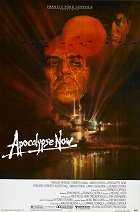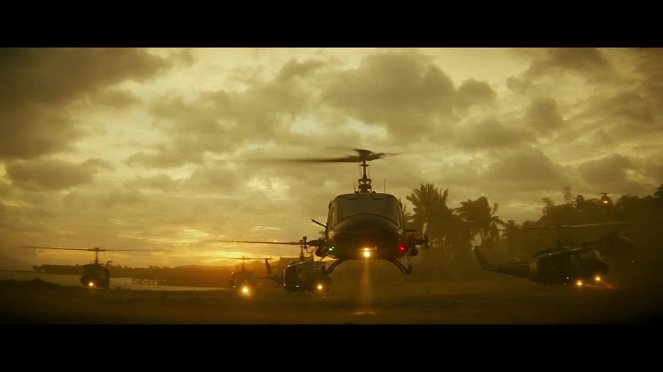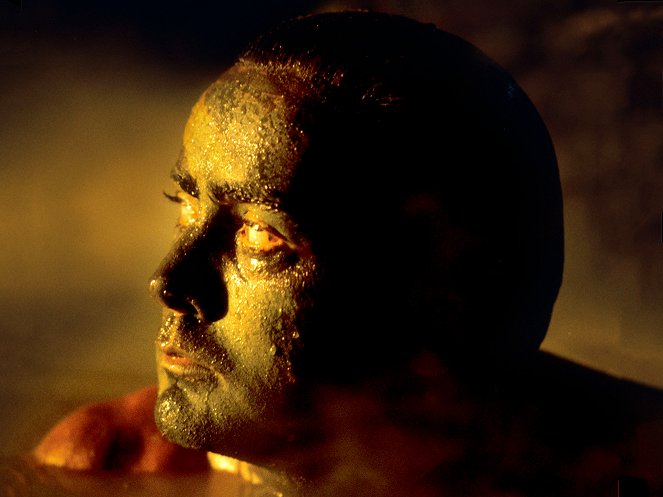Directed by:
Francis Ford CoppolaCinematography:
Vittorio StoraroCast:
Martin Sheen, Marlon Brando, Robert Duvall, Frederic Forrest, Sam Bottoms, Laurence Fishburne, Albert Hall, Harrison Ford, Dennis Hopper, G. D. Spradlin (more)VOD (2)
Plots(1)
Martin Sheen stars as Captain Willard, who is sent on a dangerous and mesmerizing odyssey into Cambodia to assassinate a renegade American Colonel named Kurtz (Marlon Brando), who has succumbed to the horrors of war and barricaded himself in a remote outpost. (official distributor synopsis)
Videos (2)
Reviews (11)
A perfectly apt title for one of the most intense and memorable films about the Vietnam War. The iconic Martin Sheen as Captain Willard is subjected to what is essentially a double apocalypse in a hard-to-describe atmosphere of Vietnamese hell that at times resembles surreal imagery. For, apart from the external dangers, he is forced to face a stiff internal battle with himself to save not only his neck but also his sanity. Martin Sheen's acting, with his expression often oscillating precisely between total madness and fickle sanity, is simply phenomenal. Art-wise, Apocalypse Now is a total triumph (especially on an OLED TV in UHD), and the surfing sequence with Robert Duvall will probably stay with me forever.
()
I first saw Apocalypse Now practically at the same time as the similarly famous film Platoon. While Stone impressed me, I had a reserved attitude toward Coppola's war drama. I couldn't help but feel a certain disappointment, which partly came from exaggerated expectations - according to many movie fans, it should have been the greatest war film of all time. The execution is undoubtedly luxurious - Coppola showcases cunning filmmaking full of suggestive scenes, the camera works wonders, and the visual compositions send shivers down your spine. Everyone interested in film direction could learn from the effective use of double exposures and crossfades (the opening scene is characteristic, where the camera focuses on the detail of a helicopter propeller and then transitions to a hotel room, where we observe the spinning fan propeller). The gloomy jungle, the fascinating panoramic shots of tropical landscapes - it all creates what we call atmosphere. The quality actors portray intense characters exposed to extreme conditions. At this juncture, everything was fine and the reputation of Apocalypse Now was not a lie. However, I have a problem with the story. Coppola took it from Joseph Conrad's novel "Heart of Darkness." Its plot takes place in Belgian Congo and anyone familiar with the history of the Congolese genocide and bloody wars of the 20th century regarding the local natural riches will understand that the story of a deranged officer who escapes any control fits perfectly. The same narrative set in the Vietnam War, combined with an American officer, seems inappropriate and exaggerated. Not to mention that Coppola is so carried away by his artistic vision that it seems like he is not shooting a war drama, but rather staging a theater. This theatrical overexertion culminates in the execution of a rebellious officer, reminiscent of a pagan ritual, and it disturbs me to such an extent that the film didn't even come close to a five-star rating from my perspective. Overall impression: 75%.
()
[Final Cut] While it's great to see people staring in disbelief at some scenes from this movie again for the first time in the theater, as a native of the Redux version, the seat beneath me was cracking down the middle with the weight of my righteous anger. If Coppola and Co. wanted to work on the fluidity of the plot, they could have cut out the French, whose scene may have some amazing architecture and work with the transformation of the intense evening light, and yet is just a bunch of terrible lines spoken with terrible music. At the same time, getting rid of the rainy camp scene is a great misfortune, as the artificiality and futility of that sequence strikes me as iconic for an illustration of war that was nicknamed "The Bog". I suspect the intention was more that they didn't really want to defend a scene to the contemporary audience that was essentially gang rape with comic relief. The next deleted scene, with Kurtz reading a newspaper article and laconically cleaning off the enthusiastic children around him, is indeed a sequence I fell asleep to twice, but that's more likely due to the protagonist's palpable feverish exhaustion that comes across to the viewer at the end. At the same time, this scene gives another interesting insight into the incomprehensible ecosystem of Kurtz's camp.
()
Conrad's “Heart of Darkness” is one of those timeless books, and it's not bad at all. It is all the more remarkable that Coppola's adaptation does not fall short in any respect, it even surpasses it in many ways. At least in the director's cut, it is an equally riveting probe through the darkness of the soul and madness.
()
This isn't a film about war, it's a braving foray into the hell of the human soul into the backdrop of Vietnam. Like Conrad's Marlowe in Heart of Darkness, Coppola's Willard travels down the river in purgatory to find hell at the end of it. The apocalypse is conceived as a sequence of diverse stories that illuminate horror from different angles. Horror is the key word in the film. It doesn't matter if it's horror from the point of view of reed warblers or the French... it's the same horror Kurtz embodied in his apocalyptic and pagan-brutal encampment. It's the same horror that's been eating Willard since the beginning... Emptiness. The removal of humanity. Coppola's film is shot in an almost cynical tone. Absurdity often evokes Heller's Catch-22 with its power... Despite the runtime the gradation is amazing... I didn't find a weak spot. Every shot, every speech, every sound creates a riveting picture of horror on the bloody canvas of the Vietnamese jungle – suffering, loss of humanity, loss of self. I'm reluctant to write that Apocalypse Now is a metaphor. No, it's eerily literal and explicit. It is a direct image that impacts through all the means used. A masterful film in every way. In terms of suggestiveness, I don't know of any stronger war films. The actors have an incredibly naturalistic feel – crazy Brando, crazy Sheen... as if hell had consumed them. Apocalypse Now is masterful in the sense that while it says much about the nature of the Vietnam conflict, its impact is universal. It reveals something from the darkness of the human soul... And as for the oft-mentioned unfinished plot... can anything be said that still lasts? Coppola's Apocalypse Now doesn't end with headlines... in the film world, maybe.
()



Ads